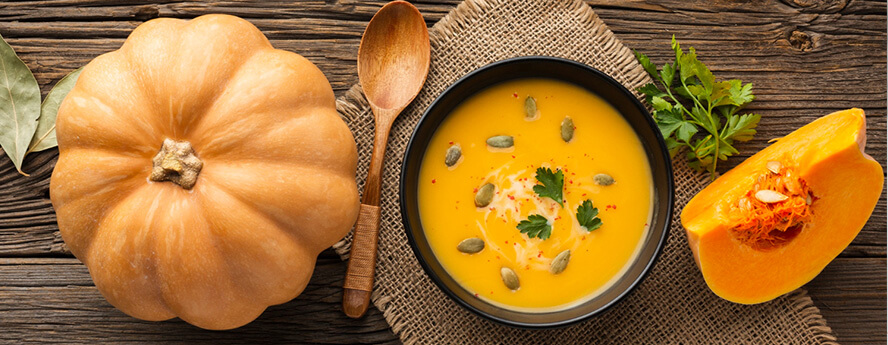
With the autumn season in full swing, the weather is becoming colder and we spend more time indoors, increasing the risk of contracting a cold, flu or even Covid-19. According to research studies, certain viruses such as rhinoviruses (responsible for common cold) spread more rapidly in colder temperatures and the exposure to cold weather can also adversely affect a person’s immune response, making us more susceptible to infections. But how can we get our bodies ready and strong to fight off illnesses in the colder seasons?
Our immune system plays a crucial role in helping us keep healthy and protected from illnesses, but it’s important to look after it and make sure it is functioning at its best.
How does the immune system work?
Every day, we are exposed to harmful foreign invaders such as microbes (bacteria, parasites or fungi) that can enter our bodies and cause infection. The skin and the digestive and respiratory system can try to stop invaders from getting inside the body, but once they are in, it’s the immune system that starts protecting us.
The immune system is not a single entity, but it refers to how the cells, tissues and organs work together to defend the body. The way the immune system reacts to invaders is extremely complex and includes chemicals in the blood, antibodies and an army of cells doing a variety of jobs.
A well-functioning immune system relies on you living a healthy lifestyle, including a healthy, varied diet with plenty of fruit and vegetables rich in vitamins and minerals. Since autumn has a lot to offer when it comes to plant-based produce, here are 5 vegetables that are in season right now and that can be part of a nutritious diet to help keep your immune system functioning well.
1. Mushrooms
Mushrooms contain active compounds called polysaccharides which act as a stimulator for the immune cell, and they also contain selenium, another nutrient that is able to support our immune system.
Mushrooms are also some of the few produce that contain vitamin D and they can even increase their vitamin D concentration if you leave them in direct sunlight for 15-20 minutes before cooking them. Vitamin D supports a healthy immune system but food alone doesn’t usually provide enough vitamin D for your body. Find out more about how to get enough vitamin D.
Even though mushrooms are available all year round in shops, autumn is considered the best season for wild mushroom hunting. However, picking wild mushrooms for consumption can be extremely dangerous if you don’t know what you’re looking for.
2. Sweet potatoes
Sweet potatoes are a good source of beta carotene. Once consumed, beta carotene is converted into vitamin A in our bodies and is taken up by our cells, including immune cells, to help them function. Vitamin A is also used for the mucous membrane of our gut along with the fibre that contributes to a healthy gut, an important part of a strong immune system.
Sweet potatoes are also a good source of vitamin C, vitamin B6 and copper which are required by our immune system.
3. Pumpkin
The pumpkin is perhaps a symbol of autumn, but besides being used as Halloween decoration, it is also a highly nutritious vegetable. Pumpkins can be enjoyed baked, roasted, in soups or in stews and curries. They are an excellent source of beta-carotene and they also contain phytonutrients like zeaxanthin, lycopene, which are all immune supporters.
4. Spinach
Spinach is a versatile crop that can be harvested all year round, including some varieties that are perfect for the autumn and winter weather. The green leaf is an excellent source of vitamin A, vitamin B6, vitamin C and folate, all of which are essential to keep your immune system working.
When cooking spinach, one of the best methods could be steaming, as this will keep as many nutrients as possible intact, while immersing spinach in water can cause more vitamins to be lost.
5. Garlic
Garlic is one of the most versatile ingredients out there and is considered a “bona-fide health food hero” because of its many health benefits. Among them, supporting the immune system is one of the most important as garlic contains vitamins A, B1, B2, B12 and D, as well as the minerals calcium, copper, iron and selenium
Garlic is also thought to have antiviral properties and could help fight different illnesses, including the common cold, influenza and viral pneumonia, but more studies are needed to validate these possible health benefits.
The importance of a balanced diet
There is little scientific evidence to prove that certain foods will ‘boost’ your immune system despite the claims you hear or read about. A more useful way of approaching this would be to think of healthy foods as a way to ‘balance’ your immune system, because a balanced immune system has a better chance of fighting illnesses and protecting your body. Since it’s autumn, why not include some seasonal produce as part of your 5 portions of fruit and vegetables a day, such as the ones mentioned above?
Disclaimer: The content of this website is provided for informational purposes only and does not substitute the medical advice from a healthcare professional.